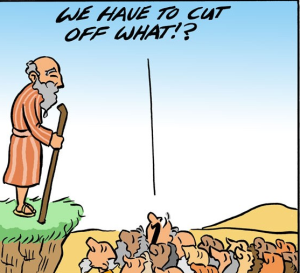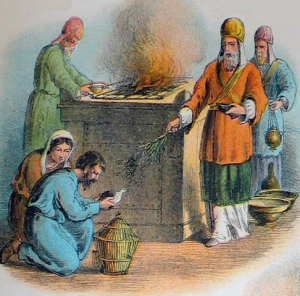Tazria 2016 – Let’s Blame Odom and Chava (Adam and Eve)
by devadmin | April 7, 2016 5:50 pm
Let’s Blame Odom and Chava (Adam and Eve)
Says the heylige Toirah (Bereishis 3:16) azoy: “To the woman He said: I will greatly increase your sorrow and your pregnancy. In sorrow will you bear children.” And why are we quoting from parshas Bereishis here in parshas Tazria? Because the RBSO did seemingly not forget the original sin of the forbidden fruit; that one keeps giving -mostly pain- and some of its consequences are tied mamish into our parsha. We will be discussing them a bit later. Ober ershtens (firstly)….
How times have changed. In hyntige modernishe tzytin (in today’s modern times), when the eishes chayil gives birth to a child, the husband is immediately obligated to buy her a nice gift. Typically this gift will manifest itself in the form of jewelry. Absent that gesture, he can forget chapping anything but grief for quite a while, the heylige Toirah’s lifting of restrictions on marital relations notwithstanding. Azoy iz iz!
Ober, back in Toirah times, when the wife gave birth, to either a boy or a girl, as part of her purification process -as described mamish in this week’s parsha- she was obligated to bring korbonos (sacrifices) in the Beis Hamikdash (Temple), two of them, before she was considered totally pure. One of those was a korban Chatos (sin offering) meant to atone for the sin or sins committed. Is giving birth mamish a sin? Did the RBSO not command that man and woman be mikayame (fulfill) the mitzvah of ‘pru-u’rvu (procreation)? Grada He did! It’s the first thing He told Odom and Chava. Is that not what the woman just did by delivering a baby boy or girl? If anything, would logic not dictate that if any korban was required, the korban Todah (thanksgiving) would be in order for having received the gift of life in the form of a child? Nu, we will have more to say about the woman, childbirth, and the grave sin she may have committed below, ober ershtens…
So happens that just this past shabbis, someone asked the Oisvorfer why Yiddin perform the bris (circumcision) ceremony on their newborn baby boys punkt (specifically) on the eighth day? Shoin, that topic too is mentioned (again) in this week’s parsha. We will answer that question and combine it with the opening rant.
In recent weeks, we have been discussing repetition in the heylige Toirah and trying to reconcile what our rebbes taught us about there being no extra words or letters in the heylige Toirah, with often repeated concepts. Let’s get real: Certain commandments are repeated, some more than others. Limoshol, over and again, the RBSO reminds His people about shabbis observance (at least eight), not to cook a young goat in its mother’s milk (three times), not to eat non kosher animals (16 times), to remember that He took us out Mitzrayim (10 times), not to worship idols (36 times), vi’chohano, vi’chohano (so on and so forth). Moreover, isn’t Sefer Devorim (Deuteronomy) also known as Mishneh Toirah, davka because it repeats many of the mitzvis already commanded? It is! And because of all this repetition, our good rabbis and so many medroshim, found themselves struggling to find pshat in each repetition. Though the RBSO rarely mentions why He repeats certain commandments, our rabbis took it upon themselves to rationalize each such mention of a mitzvah. They tell us, over and again, that each has a specific purpose. It’s first mention was meant to teach lesson A, while mention B was for a totally different lesson. The bottom line is azoy: The Toirah does repeat certain mitzvis and this week, we will be introduced to a mitzvah which harkens back to parshas Lech Lecha over in Bereishis.
 The year is 2047 and our zeyda (forefather) Avrohom is 99 years old. His son Yishmoel is almost bar mitzvah age. And out of nowhere mamish, the RBSO will tell Avrohom (Bereishis 17:1) that he is to undergo a bris in order to become ‘tomim’ (complete) with the RBSO. Though a good man, mistama the very first monotheist, he was not yet complete. Moreover, the bris will henceforth be a sign between Avrohom and the RBSO. Avrohom will, after a cut below, become a cut above others, and will be the first Yid. Grada this was the very first mitzvah the RBSO gave to Avrohom. Shoin and mazel tov. A few pisukim later (Bereishis 17:12), the RBSO will give further instructions: “at the age of eight days, every one of your males shall be circumcised…” Shoin there you have it. We were commanded to perform a bris and specifically on the eighth day. Why? Because that’s what the RBSO commanded. He never did tell us why. Seemingly that number was significant to the RBSO, isn’t that reason enough? One day when you get to meet your Maker, and if you can still speak after answering all of His question about your life and how you may have abused your bris, if you chap, feel free to ask Him why He davka wanted the bris to take place on the eighth day. Until then, let’s see what a few suggested was the significance of the eighth day choice. There must be one that talks to you.
The year is 2047 and our zeyda (forefather) Avrohom is 99 years old. His son Yishmoel is almost bar mitzvah age. And out of nowhere mamish, the RBSO will tell Avrohom (Bereishis 17:1) that he is to undergo a bris in order to become ‘tomim’ (complete) with the RBSO. Though a good man, mistama the very first monotheist, he was not yet complete. Moreover, the bris will henceforth be a sign between Avrohom and the RBSO. Avrohom will, after a cut below, become a cut above others, and will be the first Yid. Grada this was the very first mitzvah the RBSO gave to Avrohom. Shoin and mazel tov. A few pisukim later (Bereishis 17:12), the RBSO will give further instructions: “at the age of eight days, every one of your males shall be circumcised…” Shoin there you have it. We were commanded to perform a bris and specifically on the eighth day. Why? Because that’s what the RBSO commanded. He never did tell us why. Seemingly that number was significant to the RBSO, isn’t that reason enough? One day when you get to meet your Maker, and if you can still speak after answering all of His question about your life and how you may have abused your bris, if you chap, feel free to ask Him why He davka wanted the bris to take place on the eighth day. Until then, let’s see what a few suggested was the significance of the eighth day choice. There must be one that talks to you.
Says the heylige Zoihar azoy: by waiting eight days, the baby will have lived through one shabbis and the ‘kidushas shabbis’ (holiness or spirit) of shabbis is what the baby requires before undergoing the bris procedure. The heylige shabbis adds a new dimension of life into the world, and once the baby has lived one shabbis, he is strengthened enough to endure the bris. And that’s taka why we refer to it as the ‘heylige shabbis.’ Gishmak! Says the Yalkut Shimoni azoy: the RBSO had mercy on the baby and said to wait eight days until the child has enough strength to endure the procedure. Grada the RBSO showed similar mercy on animals and decreed (parshas Emor) that one desirous of, or, one obligated to bring any korban, must bring an animal no younger than eight days. Mistama the RBSO knew that on occasion, man would sadly behave more like an animal; mankind did not disappoint.
Ober, says the Sefrono azoy: we delay the bris until day eight because the newborn still has a level of defilement in his body until that day. And where did this defilement come from? The baby, during the first seven days, is still being sustained from the residual menstrual blood that he had imbibed before his birth. Residual menstrual blood? Yikes! We will soon get to the menstrual blood and then tie this altogether. It will mamish be gishmak.
 Ober says the heylige Gemora (Nidoh 31B) which avada understood the need for sexual relations between a husband and wife and how important this could be, azoy: the heylige Toirah tells us that the mother becomes impure upon delivery and so she remains for seven days. We davka make the bris on the eighth day so that the mother can become purified and thereby be allowed to her husband. In this scenario, not just will the guests at the bris be happy with the great celebratory spread prepared for the occasion, seemingly, so will the parents from the spread, if you chap. Shoin, now you know why many love the heylige Gemora. They chapped that man needs to. Avada this is all good in theory, in reality however, and in today’s times, when restrictions on the woman have been extended by our good and thoughtful rabbis, she is no longer available to her husband on day eight. In fact, she has no desire to be with her husband -period end discussion- until around month eight, if then. Grada, this taka begs the following question: Given that her restrictions on relations were dramatically extended, can the bris date too be extended? The answer is no!
Ober says the heylige Gemora (Nidoh 31B) which avada understood the need for sexual relations between a husband and wife and how important this could be, azoy: the heylige Toirah tells us that the mother becomes impure upon delivery and so she remains for seven days. We davka make the bris on the eighth day so that the mother can become purified and thereby be allowed to her husband. In this scenario, not just will the guests at the bris be happy with the great celebratory spread prepared for the occasion, seemingly, so will the parents from the spread, if you chap. Shoin, now you know why many love the heylige Gemora. They chapped that man needs to. Avada this is all good in theory, in reality however, and in today’s times, when restrictions on the woman have been extended by our good and thoughtful rabbis, she is no longer available to her husband on day eight. In fact, she has no desire to be with her husband -period end discussion- until around month eight, if then. Grada, this taka begs the following question: Given that her restrictions on relations were dramatically extended, can the bris date too be extended? The answer is no!
Nu, we taka have several rational approaches as to why the RBSO ordered the bris on day eight, ober, efsher we can ask azoy: should the bris efsher be performed after day eight? Why not after several months or even years when the baby is stronger, more developed and in better physical shape to endure the surgical procedure? Taka not a stupid kasha and one that’s addressed by the RambaM (Moireh Nivuchim 3:49) where he tells us azoy: one’s love for his child increases as the child grows and matures. A father becomes more attached to his son daily. Had the heylige Toirah commanded that a bris ceremony be held when the child was older, there is a chasash (fear) that the father would loathe this procedure and thereby efsher abandon this critical mitzvah.. Shoin: Day eight it is and remains. Grada, as we will read mamish below, there were times in our history when the Yiddin did not fulfill this mitzvah.
Avada these are all theories. Which is it? Which of these prompted the RBSO to select day eight? Ver Veyst and it’s gantz shayich (entirely possible) that it was none of the above. Grada, very recently the Oisvorfer either heard of read a story about some choshove (esteemed) and famous rebbe whose minhag (custom) it was to cut his nails following immersion into the mikveh (ritual bath). What did the chasiddim do? Chasiddim see, chasiddim do. Shoin, soon his followers were all cutting their nails following their mikveh rituals. Sadly, a few added other more nefarious activities to their mikveh experiences, if you chap, which they sadly have. Shoin, that for another day. Eventually, one chosid’s curiosity got the better of him. He approached the rebbe and asked why he cuts his nails davka after the mikveh dip. Said the rebbe: Why? Because they are softer after soaking in the mikveh. Shoin! The bottom line: the bris, if the baby is otherwise healthy and not too yellow, is performed on the eighth day, Shabbis, Yom Tov, and even Yom Kippur notwithstanding. So happens that the Oisvorfer and eishes chayil taka made a Yom Kippur bris.
Earlier we mentioned that the bris, mentioned in the third posik (verse) of our parsha, was previously known as a commandment and we asked why it’s being repeated? Moreover, just in case the Yiddin forgot about this mitzvah which mamish brings one into the fold, or due to mitigating circumstances could not have one, or, stam azoy for convenience sake, stopped performing this mitzvah -limoshol we will learn that many of them, while enslaved and efsher to chap a few Mitzri shiksas, did not undergo the bris- the RBSO in parshas Boi (Exodus) did interrupt the myseh of the plagues and did instruct the Yiddin about the korban Pesach (paschal lamb). Included in those were what to prepare, when and who could partake. Those uncircumcised could not. What to do? No one likes to miss out on a good meal and shoin, they underwent a mass circumcision with Moishe and Aharoin officiating, one as the Moiel and the other as the Sandik. Moishe of course knew how critical it was to undergo a bris because not too long back, according to a medrish or two, and while on his way to Mitzrayim with his eishes chayil Tzipoira and kids in tow, a snake came along -some say two- and swallowed Moishe from his toes to his eyver (penis). Tzipoirah, Moishe’s wife chapped what was going on, and immediately performed a bris on one of her kids – which one of them is avada subject to a machloikes. Shoin, as soon as the bris was performed, the snake released Moishe. In any event, Moishe was of course very sensitive to this mitzvah.
 Another medrish will teach us of yet another mass circumcision which took place just before the RBSO came down to deliver the Aseres Hadibrois (Ten Commandments). Of course He wasn’t going to go through with the wedding to the Yiddin while they remained uncircumcised and shoin, again they were reminded. We assume that this new group included the ‘erev rav’ and that those whose membership was not in question, did not volunteer for another cut. Ober as our parsha opens it’s at least 400 years later and guess what? Says the heylige Toirah (Vayikro 12:3) azoy: “And on the eight day, you shall circumcise his foreskin.” Shelte zich di shaylo (the question arises): what’s new here and why is the RBSO repeating a mitzvah he clearly delineated on several occasions?
Another medrish will teach us of yet another mass circumcision which took place just before the RBSO came down to deliver the Aseres Hadibrois (Ten Commandments). Of course He wasn’t going to go through with the wedding to the Yiddin while they remained uncircumcised and shoin, again they were reminded. We assume that this new group included the ‘erev rav’ and that those whose membership was not in question, did not volunteer for another cut. Ober as our parsha opens it’s at least 400 years later and guess what? Says the heylige Toirah (Vayikro 12:3) azoy: “And on the eight day, you shall circumcise his foreskin.” Shelte zich di shaylo (the question arises): what’s new here and why is the RBSO repeating a mitzvah he clearly delineated on several occasions?
Nu, to chap all this, we need to learn a few more pisukim where the heylige Toirah teaches us – and as mentioned way above- that a woman becomes impure during childbirth. Our rabbis call this ‘tumas leydo’.
| 1 And the Lord spoke to Moses, saying: | אוַיְדַבֵּ֥ר יְהֹוָ֖ה אֶל־משֶׁ֥ה לֵּאמֹֽר: | |
| 2 Speak to the children of Israel, saying: If a woman conceives and gives birth to a male, she shall be unclean for seven days; as [in] the days of her menstrual flow, she shall be unclean. | בדַּבֵּ֞ר אֶל־בְּנֵ֤י יִשְׂרָאֵל֙ לֵאמֹ֔ר אִשָּׁה֙ כִּ֣י תַזְרִ֔יעַ וְיָֽלְדָ֖ה זָכָ֑ר וְטָֽמְאָה֙ שִׁבְעַ֣ת יָמִ֔ים כִּימֵ֛י נִדַּ֥ת דְּוֹתָ֖הּ תִּטְמָֽא: | |
| 3 And on the eighth day, the flesh of his foreskin shall be circumcised. | גוּבַיּ֖וֹם הַשְּׁמִינִ֑י יִמּ֖וֹל בְּשַׂ֥ר עָרְלָתֽוֹ: | |
| 4 And for thirty three days, she shall remain in the blood of purity; she shall not touch anything holy, nor may she enter the Sanctuary, until the days of her purification have been completed. | דוּשְׁלשִׁ֥ים יוֹם֙ וּשְׁל֣שֶׁת יָמִ֔ים תֵּשֵׁ֖ב בִּדְמֵ֣י טָֽהֳרָ֑ה בְּכָל־קֹ֣דֶשׁ לֹֽא־תִגָּ֗ע וְאֶל־הַמִּקְדָּשׁ֙ לֹ֣א תָבֹ֔א עַד־מְלֹ֖את יְמֵ֥י טָֽהֳרָֽהּ: | |
| 5 And if she gives birth to a female, she shall be unclean for two weeks, like her menstruation [period]. And for sixty six days, she shall remain in the blood of purity. | הוְאִם־נְקֵבָ֣ה תֵלֵ֔ד וְטָֽמְאָ֥ה שְׁבֻעַ֖יִם כְּנִדָּתָ֑הּ וְשִׁשִּׁ֥ים יוֹם֙ וְשֵׁ֣שֶׁת יָמִ֔ים תֵּשֵׁ֖ב עַל־דְּמֵ֥י טָֽהֳרָֽה: | |
| 6 And when the days of her purification have been completed, whether for a son or for a daughter, she shall bring a sheep in its first year as a burnt offering, and a young dove or a turtle dove as a sin offering, to the entrance of the Tent of Meeting, to the kohen. | ווּבִמְלֹ֣את | יְמֵ֣י טָֽהֳרָ֗הּ לְבֵן֘ א֣וֹ לְבַת֒ תָּבִ֞יא כֶּ֤בֶשׂ בֶּן־שְׁנָתוֹ֙ לְעֹלָ֔ה וּבֶן־יוֹנָ֥ה אוֹ־תֹ֖ר לְחַטָּ֑את אֶל־פֶּ֥תַח אֹֽהֶל־מוֹעֵ֖ד אֶל־הַכֹּהֵֽן: | |
| 7 And he shall offer it up before the Lord and effect atonement for her, and thus, she will be purified from the source of her blood. This is the law of a woman who gives birth to a male or to a female. | זוְהִקְרִיב֞וֹ לִפְנֵ֤י יְהֹוָה֙ וְכִפֶּ֣ר עָלֶ֔יהָ וְטָֽהֲרָ֖ה מִמְּקֹ֣ר דָּמֶ֑יהָ זֹ֤את תּוֹרַת֙ הַיֹּלֶ֔דֶת לַזָּכָ֖ר א֥וֹ לַנְּקֵבָֽה: |
Earlier we asked what sin the woman may have committed that now requires a sin offering. Was she involved in some form of iniquitous behavior? Nu, as it turns out, menstruation, childbirth and its resultant impurities, the purification process, including the requirement to bring two separate offerings of which one is a ‘sin offering’, and the bris on day eight, are all intertwined. It’s one bloody mess. We would easily chap having to bring a korban Chatos were the baby she just delivered out of wedlock, or, efsher from another man, oy vey. Ober the case the heylige Toirah is describing seems to be of a woman, her husband and their baby. Why did the Toirah require her to bring a sin offering? And why is she impure?
 Nu, as expected, the heylige Gemora had the same question. Said the heylige Tanna Rebbe Shimon bar Yochai (Nido 31A) azoy: when the woman kneels in labor (or, whatever position she may find herself in during labor), mistama due to the givaldige pains she is experiencing, she swears impetuously that she will never again have intercourse with her husband. Ober, because as a married woman, she is required to service her husband, or (at a minimum) allow her husband to service her, whatever the case may be if you chap, this oath cannot be kept. Shoin, she swore falsely. Therefore she is required to bring the Chatos. Ober when the Oisvorfer discussed this very topic with a reader, he asked azoy: “why should she be michuyev (obligated) to bring the korban when she mamish meant just what she had sworn?” Is it not the case that once a woman has a child, her desires for intimacy with her husband are dramatically diminished, and are efsher mamish kimat non-existent? Indeed they are. Al-achas-kamo-v’kammo (how much more so) when she has more children. Taka an excellent point. Grada, another medrish will suggest that her sin offering was prompted by her fleeting thoughts never to endure another pregnancy.
Nu, as expected, the heylige Gemora had the same question. Said the heylige Tanna Rebbe Shimon bar Yochai (Nido 31A) azoy: when the woman kneels in labor (or, whatever position she may find herself in during labor), mistama due to the givaldige pains she is experiencing, she swears impetuously that she will never again have intercourse with her husband. Ober, because as a married woman, she is required to service her husband, or (at a minimum) allow her husband to service her, whatever the case may be if you chap, this oath cannot be kept. Shoin, she swore falsely. Therefore she is required to bring the Chatos. Ober when the Oisvorfer discussed this very topic with a reader, he asked azoy: “why should she be michuyev (obligated) to bring the korban when she mamish meant just what she had sworn?” Is it not the case that once a woman has a child, her desires for intimacy with her husband are dramatically diminished, and are efsher mamish kimat non-existent? Indeed they are. Al-achas-kamo-v’kammo (how much more so) when she has more children. Taka an excellent point. Grada, another medrish will suggest that her sin offering was prompted by her fleeting thoughts never to endure another pregnancy.
Ober why does the woman taka get those giferliche menstrual and childbirth pains? What horrible crimes did she commit? And why does she become impure and need to wait seven days from the birth of boy and fourteen from the birth of a girl to begin the purification process? And why must she wait an additional 33 days for a baby boy and 66 for a daughter before she complete the purification process by bringing the offerings?
 Nu, let’s go back to page one and the opening paragraph. There we quoted from Bereishis where the RBSO, in response to Chava’s (Eve’s) participation in the forbidden fruit incident -which He never forgot or seemingly forgave- decreed that henceforth, woman would suffer during their pregnancies. Childbirth would be forever painful. Let’s taka recall what He told Chava: “I will greatly increase your sorrow and your pregnancy” (Bereishis 3:16). Says the heylige Gemora azoy: increased sorrow davka refers to menstrual blood. Pshat being that absent of Chava’s appetite for the forbidden, it’s gantz shayich (probable) that woman would never have had to endure any blood and efsher could have become pregnant without ever having a menstrual cycle. Pregnancy and childbirth would have been seamless and painless. We assume that pregnancy would still involve some physical contact.
Nu, let’s go back to page one and the opening paragraph. There we quoted from Bereishis where the RBSO, in response to Chava’s (Eve’s) participation in the forbidden fruit incident -which He never forgot or seemingly forgave- decreed that henceforth, woman would suffer during their pregnancies. Childbirth would be forever painful. Let’s taka recall what He told Chava: “I will greatly increase your sorrow and your pregnancy” (Bereishis 3:16). Says the heylige Gemora azoy: increased sorrow davka refers to menstrual blood. Pshat being that absent of Chava’s appetite for the forbidden, it’s gantz shayich (probable) that woman would never have had to endure any blood and efsher could have become pregnant without ever having a menstrual cycle. Pregnancy and childbirth would have been seamless and painless. We assume that pregnancy would still involve some physical contact.
The bottom line is seemingly azoy: every pregnancy and childbirth is a reminder of Chava and the original sin. Shoin, there you have it, it’s all her fault! And the now required sin offering is efsher meant to atone for the sin of Chava which as we stated above, keeps on giving. Moreover, efsher we can now also chap why a women remains impure twice as long for the birth of a girl; it was after all Chava, mother of all mankind, that sinned, caused her husband to sin – efsher by swearing that she would never again service him- and every newborn female is a potential Chava. Yikes!
 Finally, as to yet another reminder to have the bris performed on U’vyoim Hashmini (eight day), some will suggest that the RBSO’s specific language was meant to teach us that the bris must take place during the day and that absent of a medical deferment, there are no exceptions when the bris does not take place on that day. And it’s mentioned here again efsher because it’s in our parsha where the RBSO taught the Yiddin all about pregnancy, menstruation, childbirth, purification and the original sin. Said Rebe azoy: “Great is the zichus (merit) of circumcision.” Despite all the great acts of devotion performed by our Patriarch Avrohom, he was not referred to as complete until he became circumcised, as it is written…’walk before me and be complete’ (Bereishis 17:1).
Finally, as to yet another reminder to have the bris performed on U’vyoim Hashmini (eight day), some will suggest that the RBSO’s specific language was meant to teach us that the bris must take place during the day and that absent of a medical deferment, there are no exceptions when the bris does not take place on that day. And it’s mentioned here again efsher because it’s in our parsha where the RBSO taught the Yiddin all about pregnancy, menstruation, childbirth, purification and the original sin. Said Rebe azoy: “Great is the zichus (merit) of circumcision.” Despite all the great acts of devotion performed by our Patriarch Avrohom, he was not referred to as complete until he became circumcised, as it is written…’walk before me and be complete’ (Bereishis 17:1).
A gittin shabbis and choidesh Nissan
The Oisvorfer Ruv
Yitz Grossman
Source URL: https://oisvorfer.com/tazria-2016-lets-blame-odom-and-chava-adam-and-eve/

